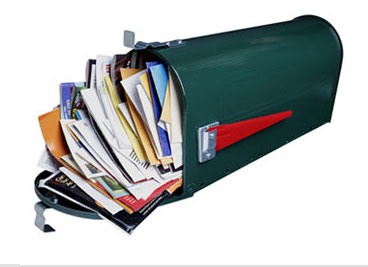Submitted by Anne Landman on
 Junk mail kills trees, clogs mailboxes, packs landfills, wastes natural resources, and everyone would be glad to be rid of it. Right?
Junk mail kills trees, clogs mailboxes, packs landfills, wastes natural resources, and everyone would be glad to be rid of it. Right?
Well, maybe not.
Whether out of environmental concern or sheer annoyance, legislated efforts to reduce junk mail are on the rise, but companies that have vested interests in its continuance have started organizing to save it--in a big way. Of course, they don't call it junk mail. Their preferred euphemisms are "advertising mail," "direct mail" or even "standard mail."
Industry Ramps Up Efforts to Preserve Junk Mail
A little-noticed, April 2008 press release from an organization called the National Association of Printing Leadership (NAPL) announced that it had awarded its 2008 "Technical Leadership Award" to Benjamin Y. Cooper for his work as "a dedicated champion and eloquent spokesman for the print media." Sounds innocent enough, but who exactly is Cooper, and what did he do to merit this award?
Cooper is a principal in the Washington, D.C.-based lobbying firm Williams & Jensen, who for almost three decades has been the chief lobbyist for the U.S. printing industry. He also heads Mail Moves America (MMA), a pro-junk mail front group that works to prevent the passage of "Do Not Mail" laws that would give consumers a way to opt out of receiving junk mail, similar to the way "Do Not Call" lists have helped people end unwanted telemarketing calls. Formed in 2007, MMA is the creation of the Direct Marketing Association (DMA), a trade association for companies and industries that profit from the creation and sending of junk mail, like printers, advertisers, paper manufacturers and paper catalogue retailers.
On its web site, MMA says "Do Not Mail" laws would be "bad public policy." It dismisses the accusation that junk mail destroys trees as "a myth," saying simply, "Direct mail is not trees, it is printed communication." In a July 10, 2007 press release, DMA President & CEO John A. Greco, Jr. called state bills to set up "Do Not Mail" lists "misguided legislation" that is "being driven by environmental, privacy, and consumer groups who often distort the facts in their efforts to eliminate advertising mail to consumers." Greco said MMA responds aggressively to Do Not Mail list initiatives with "convincing information about the consumer benefits of advertising mail."
U.S. Postal Service: Using Third Party Technique to Preserve Junk Mail?
The U.S. Postal Service (USPS) is another player with a vested interest in the junk mail issue. It derives a substantial portion of its revenues from bulk mailers, so giving people the ability to opt out from receiving junk mail would threaten its budget. The Postal Service is prohibited from lobbying Congress on its own behalf, so it cannot directly oppose “Do Not Mail” legislation. According to the Washington Post, however, the USPS is "working closely with the Direct Marketing Association ... in its new campaign -- Mail Moves America -- which is designed to quash the Do Not Mail initiatives." Thus, even our trusted post office is not beyond using the third party technique to achieve a business goal.
A related pro junk-mail effort is a new web site called IP Moves the Mail, started by the International Paper Company. International Paper is a multinational corporation with offices around the world, and as a paper manufacturer, it stands to lose business if laws are enacted that reduce the quantity of paper being dropped into mailboxes. "IP Moves the Mail" therefore facilitates pro-junk mail activism, urging visitors to contact their legislators and oppose passage of "Do Not Mail" bills.
Most people don't like the mounting number of unsolicited ads that arrive in their mail and would be happy to have a way to be rid of them. In a world of diminishing resources, junk mail consumes tremendous amounts of dwindling resources, most of which ends up as trash. At a time when people are increasingly using electronic communication, is it right or sensible to give credence to a fight to preserve what might be an anachronistic industry whose time might be naturally winding down anyway? Would it be so bad to create a way for only those consumers who want paper junk mail to be the ones to receive it? Despite the junk mail industry's "sky-is-falling" attitude, legislation allowing consumers to block unwanted mail probably wouldn't end the world. "Do Not Mail" bills, in addition to saving increasingly precious natural resources, just might give people some peace until advertisers start finding more ingenious and less harmful ways to put their ads under our noses.

Comments
Anonymous replied on Permalink
junk mail
openminded replied on Permalink
do not mail
Rezzie Dannt replied on Permalink
what precious natural
Anne Landman replied on Permalink
Response
Matt Broder replied on Permalink
A couple of points to consider
Mutternich replied on Permalink
Uh-huh. Coming and going, as the saying goes.
Rezzie Dannt replied on Permalink
I argue that consumers
junkmailgalaxy replied on Permalink
Junk mail has benefits too! Really. No, we're serious.
Mutternich replied on Permalink
Do the majority of people
Rezzie Dannt replied on Permalink
if you received a 30% off
Pages